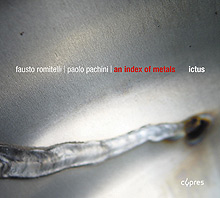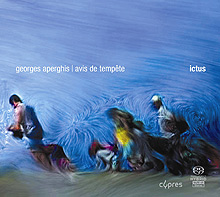Ictus Rocks: New Romitelli and Aperghis on Cyprès
|
Grant Chu Covell [June 2006.] Released last year but not generally available in the US until now, two Cyprès products demonstrate Ictus’ strong presence at New Music’s bleeding edge. Both score high points. I’m a big Aperghis and Romitelli fan and have yet to meet an unsatisfactory Ictus performance or Cyprès disc. Both would have been in my 2005 “Year’s Best” if I had compiled such a list. Now that they can be found stateside, they lead my “Year’s Best” for 2006. Truth be told, I’d rather see you spending a couple of hours auditioning both than reading these effusions. Be warned that the two hours (59:07 + 49:35) can quickly exceed four: The Romitelli comes with a double-sided DVD (PAL and NTSC formats) which offers the accompanying video in single- and three-screen presentations. The harrowing Aperghis score can be downloaded for thumbing at leisure.
Fausto ROMITELLI: An Index of Metals (2003). Donatienne Michel-Dansac (sop.), Ictus, Georges-Élie Octors (cond.). Cyprès CYP5622 (http://www.cypres-records.com/). Distributed in the US by Forte Distribution (http://www.fortedistribution.com/). 1 audio-CD + 1 DVD (PAL and NTSC). Felled by illness, Romitelli died a few months after An Index of Metals’ premiere. To complete the work, he put in 15-hour days for more than seven weeks. The single-minded purposefulness shows; here was a major talent snuffed at a horizon’s edge. Doubtless Romitelli’s early passing inflates his meager catalog’s significance. Hard to cozy up to yet easy to respect, An Index of Metals warrants attention. The composition impresses me as more of a manifesto suggesting future preoccupations than a summation. One wonders whether Romitelli’s sweaty embrace of pop music, rock especially, gave Ictus license to tread the abyss’s edge, as if to emphasize the composition’s novelty and our loss, by posturing slightly more than the composer had intended. In addition to Michel-Dansac’s waif-like disembodied voice, the score requires flute, oboe / English horn, clarinet / bass clarinet, trumpet, trombone, electric guitar, electric bass, piano / sampler, violin, viola, cello, and electronic engineer. If you’re expecting Pierrot Lunaire’s grandchild, you’ll be overwhelmed by the electronic transformations and the ensemble’s delight in vulgarity. Everyone, apparently amplified, cultivates a rather raw sound. Romitelli’s harmonic sense owes much to the spectralist Grisey: Turn down the amplification and An Index of Metals bears strong resemblance to the Partiels and Transitoires sections of Les espaces acoustiques. Cut-up techniques predominate across the text settings and the instrumental Adagio, Finale and Cadenza. The work ends brusquely, as if the tape ran out. The opening, the slurp of a record starting and abruptly stopping, is lifted from Pink Floyd’s “Shine On You Crazy Diamond” (Capitol CDP 7243 8 29750 2 1). Four brief electronic intermezzi attributed to Pan Sonic appear between other movements. Despite on-screen footage accompanying these “knee plays” (short contrasting bits between larger acts, as David Byrne did for Philip Glass and Robert Wilson’s Einstein on the Beach), it remains unclear whether Romitelli chose this collaborator. Kenka Lèkovich’s English-language text, metalsushi, riffs on Roy Lichtenstein’s iconic pop-art painting “Drowning Girl” (“I’d rather sink … than call Brad for help!”). The words are a silly, prepubescent mishmash tartly seasoned with chemical and industrial imagery:
Perfect grist for genre-bending Romitelli, though I had expected a more mature ultimate statement. The music wanes without Paolo Pachini and Leonardo Romoli’s videos, best experienced in the three-screen format but here only playable on a computer’s display. The images were not digitally created, only heavily edited and sequenced. For the bulk of the score, lights bounce across shiny abraded metal, like peripheral glances at traffic through rain-soaked windshields. Blurry blue segments suggest marine life seen through thick aquarium glass. In the latter half a kaleidoscope refracts building exteriors. Occasional circular frames suggest peering through a lens or at cultures in Petri dishes. (Some segments with regularly spaced openings appear to have been shot through a gigantic revolving drum with holes like a cheese grater.) Many times the pin-lit metal’s filtered glow shares similarities with x-rayed ligaments and flesh. Silvery blips swim like spermatozoa. Flames and multi-colored detritus appear towards the end. Such life-cycle metaphors emphasize a pulled-back curtain on a new frontier. Beyond a recent easily obtainable Cyprès disc, tracking down other Romitelli requires persistence. Three out-of-print CDs document the Milanese “Nuove Sincronie 92” festival; an early work, the gestural La sabbia del tempo (1991), lies buried among them on Sincronie sin 1013 (http://www.stradivarius.it/ carries all three at remarkable discount). This episodic sextet for flute / bass flute, clarinet / bass clarinet, string trio and subtle synthesizer, performed by Ensemble L’Itineraire, confirms that Romitelli studied with Donatoni. He boldly engages electronics in the mature Flowing Down Too Slow (2001), wherein two synthesizers compete with two string quartets, percussion and double-bass. Slip-sliding strings cavort over a bass and percussion passacaglia-like ground, a common texture in Romitelli’s last works. Find this on an increasingly rare three-disc Art Zoyd / Musiques Nouvelles collaboration, “Experiences de Vol” (Sub Rosa SR192). Apparently, my copy was the last in stock at http://www.mimaroglumusicsales.com/.
Georges APERGHIS: Avis de Tempête (2004). Donatienne Michel-Dansac (sop.), Johanne Saunier (actress), Lionel Peintre, Romain Bischoff (bar.); Ictus, Georges-Élie Octors (cond.). Cyprès CYP5621 (http://www.cypres-records.com/). SACD. Distributed in the US by Forte Distribution (http://www.fortedistribution.com/). Aperghis dedicated Avis de Tempête to Romitelli’s memory. This astounding, brashly textured opera with its invasive electronics and rapid cut-up techniques sounds very much like the late Italian’s work. However Aperghis and co-librettist Peter Szendy’s linguistic prowess ups the ante. Their ambiguous text, a high-calorie hash of Baudelaire, Hugo, Kafka, Melville and Shakespeare, flutters between French and English, suggests Queneau’s exercises or a stuttering lexicographer indexing nonsense. Aperghis has long resided beyond contemporary music’s orthodoxies. A belated invitation from IRCAM resulted in 2000’s Machinations, a spectacle for four female voices with real-time audio and video manipulation (Accord 472 916-2). Jean-Luc Plouvier, Ictus’ able pianist on both Cyprès releases, succinctly characterizes the composer’s intent to “pervert IRCAM.” Aperghis joined with IRCAM sound engineer / composer Sébastien Roux to pre-record the vocalists and instrumentalists. Extensively manipulated results appear in tape segments that a sound engineer or instrumentalist triggers. Other recorded bits are poured into samplers played by two keyboardists following precisely notated parts. In addition to the tape and samplers, the score specifies one soprano, two baritones, an actress, bass clarinet, viola, cello, piccolo / bass flute, horn, trumpet, trombone, electric guitar and a speaking conductor. Avis de Tempête is a vivid sonic experience. The taped episodes, alternately alone or backing the rushing ensemble, contain the most exhilarating and demonic material I’ve heard in a long time. Chion’s Requiem (empreintes DIGITALes IMED 9312) instantly sprang to mind. Granular synthesis (sub-second samples are repeated and reordered in a collage-like manner) creates skipping bursts of distorted singers and instrumentalists. Eventually there’s a taped sequence that sounds like a pinball machine, elsewhere reminders of François-Bernard Mâche’s work with tape and sampler. Downloading the score for perusal may actually retard comprehension. The CD’s 13 tracks (“Avis 1” to “Avis 13”) don’t correspond to sections in the score. Most disconcertingly, the conventionally notated synthesizers frequently issue sounds that mimic live instruments and singers, thus making lines difficult to follow. The beat holds relatively steady at a rapid eighth-note = 120. Aperghis routinely subdivides the 32nd notes, creating multiple simultaneous rhythms. Slow sections levitate in wary expectation of further onslaughts. Bass clarinet, viola and cello form one group, flute and brass another. Strings work mostly in high registers, pushing their range. Now and again, everyone rips through microtonal passages. Sometimes the performers contend with rapid multiphonics or breath-tones. Unlike Romitelli, Aperghis minimizes the electric guitar’s grunge, with an early solo recalling Strauss’ Don Juan. Ever frenetic, panicky pace changes suggest a new stylistic direction, as if having tasted IRCAM’s technology the composer became an addict. Yet Aperghis’ characteristic irony emerges when the conductor speaks. Describing a scene like a director, “Calme: pas de vent, la fumée s’élève verticalement,” the bustling ensemble falls silent, as if the electricity had been cut. The daunting vocal parts begin with the baritones in eerie falsetto. Later the soprano enters at her top range, squeezing out microtonally shifting syllables in tricky rhythms (Michel-Dansac is also a veteran of Machinations). Sometimes they imitate recorded speech played backwards. Most often they must sing or talk as fast as possible, delivering fractured texts in heightened emotional states: drowning, drugged, in pain or, less often, recuperating:
Somewhere in this a storm and its destructive wake occur. (Creation is a theme in Machinations.) Comprehensibility was never the point. Perhaps Aperghis wanted to portray man’s helplessness against nature’s omnipotence. Psychological and physical stresses are definitely part of the picture. I can’t imagine how anyone can actually create such breathless, violent chaos. Truly brilliant, Avis de Tempête is a gauntlet thrown down for anyone naïve or brave enough to push a pencil or tap a keyboard in the 21st century. True to form, Cyprès has captured a precious production where everything comes together flawlessly.
[More Grant Chu Covell]
[Previous Article:
Italian Vacation 4. (con Claudio)]
[Next Article:
Further Aperghis Sightings]
|

